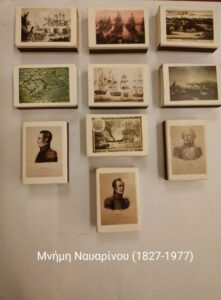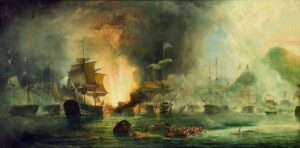 October 20, 1977 marked the 150th anniversary of the naval battle of Navarino and in commemoration of that event a series of matchboxes consisting of 10 different matchboxes was released. These matchboxes were not released in large numbers, for this they are relatively rare.
October 20, 1977 marked the 150th anniversary of the naval battle of Navarino and in commemoration of that event a series of matchboxes consisting of 10 different matchboxes was released. These matchboxes were not released in large numbers, for this they are relatively rare.
Greece, of course, continues to honor the contribution of the naval battle of Navarino.
This year, in addition to the festive events that took place in Pylos, descendants of the Admirals of the naval battle were honored by the Greek state for the contribution of their ancestors.
The Battle of Navarino was an important milestone in the struggle for Greek independence that began in 1821. Initially, the great European powers refused to help Greece free itself from the Ottoman yoke, but this did not prevent the Greeks from recording huge victories, which revived the morale of the Greeks for their independence. In 1825, however, the balance of power changed when the High Gate called on Mehmet Ali Pasha of Egypt. The situation of the Greek insurgents deteriorated dramatically.
An important role then was played by the philhellenic movement, which developed especially from the siege of Messolonghi and the heroic exit. Thanks to philhellenism, European public opinion takes the side of the Greeks. Governments are cautious at first, but the political landscape changes when Tsar Nicholas I decides to support orthodox Greeks. France and Great Britain are allied with Russia, seeking, for humanitarian reasons, a truce, through an ultimatum accepted by the Greeks but not by the High Gate, which believes that foreign actors are interfering in its internal affairs.
Each of the three Great Powers sends its ships to mediate between the two rivals. The Egyptian and Turkish fleets, consisting of 52 vessels, are located in the Gulf of Navarino. The westerners decided to enter the bay to force the Ottomans to return to their bases in Alexandria and Constantinople and to stop Ibrahim’s advance on Moria.
The clash with Ibrahim’s fleet, which was numerically stronger, began at noon on October 20 and continued until the evening, when there was only one Turkish ship left that had not sunk or burned. More than 3,000 Turks and Egyptians lost their lives, while the Allies counted 177 dead and 470 wounded.
T he public opinion in Europe, which for years watched the bloodshed of the Greek people and the apathy of the leaders of the Great Powers, accepted with great joy the result of the naval battle and considered it as a victory of the peoples in defiance of the decisions of the political leaderships.
he public opinion in Europe, which for years watched the bloodshed of the Greek people and the apathy of the leaders of the Great Powers, accepted with great joy the result of the naval battle and considered it as a victory of the peoples in defiance of the decisions of the political leaderships.
The French academic Pierre Antoine Lebrine (1785-1873) wrote:
The battle of Navarino was an achievement of the peoples … The cannons of Navarino became the beginning of a new era and triumphantly announced the rise of public opinion and its rise above the thrones …

